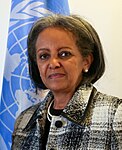A snap presidential election was held in Ethiopia on 25 October 2018, prompted by the resignation of incumbent Mulatu Teshome.[1][2] It was the fifth presidential election of the Federal Democratic Republic of Ethiopia to elect its fourth president.[3]
| ||||||||||||||
| ||||||||||||||
| ||||||||||||||
Diplomat Sahle-Work Zewde was elected without contest to a six-year term, becoming Ethiopia's first non-royal female head of state[4][5] and the first female head of state since the death of Empress Zewditu in 1930.[1]
Background and electoral process
As a parliamentary republic, most administrative power and the effective ability is vested in the prime minister and his government, rather than the president, leaving the president as primarily a figurehead executive. However, the president retains significant Reserve powers granted by the constitution.[citation needed]
A presidential candidate is required to be elected by a joint session of the upper house and lower house of the Ethiopian parliament, the Federal Parliamentary Assembly, the House of Federation and the House of Peoples' Representatives, respectively.[6]
The outgoing president, Mulatu Teshome had been elected in 2013 to a six-year term ending in 2019, but resigned for unspecified reasons, necessitating an early election.[1]
References
Wikiwand in your browser!
Seamless Wikipedia browsing. On steroids.
Every time you click a link to Wikipedia, Wiktionary or Wikiquote in your browser's search results, it will show the modern Wikiwand interface.
Wikiwand extension is a five stars, simple, with minimum permission required to keep your browsing private, safe and transparent.

